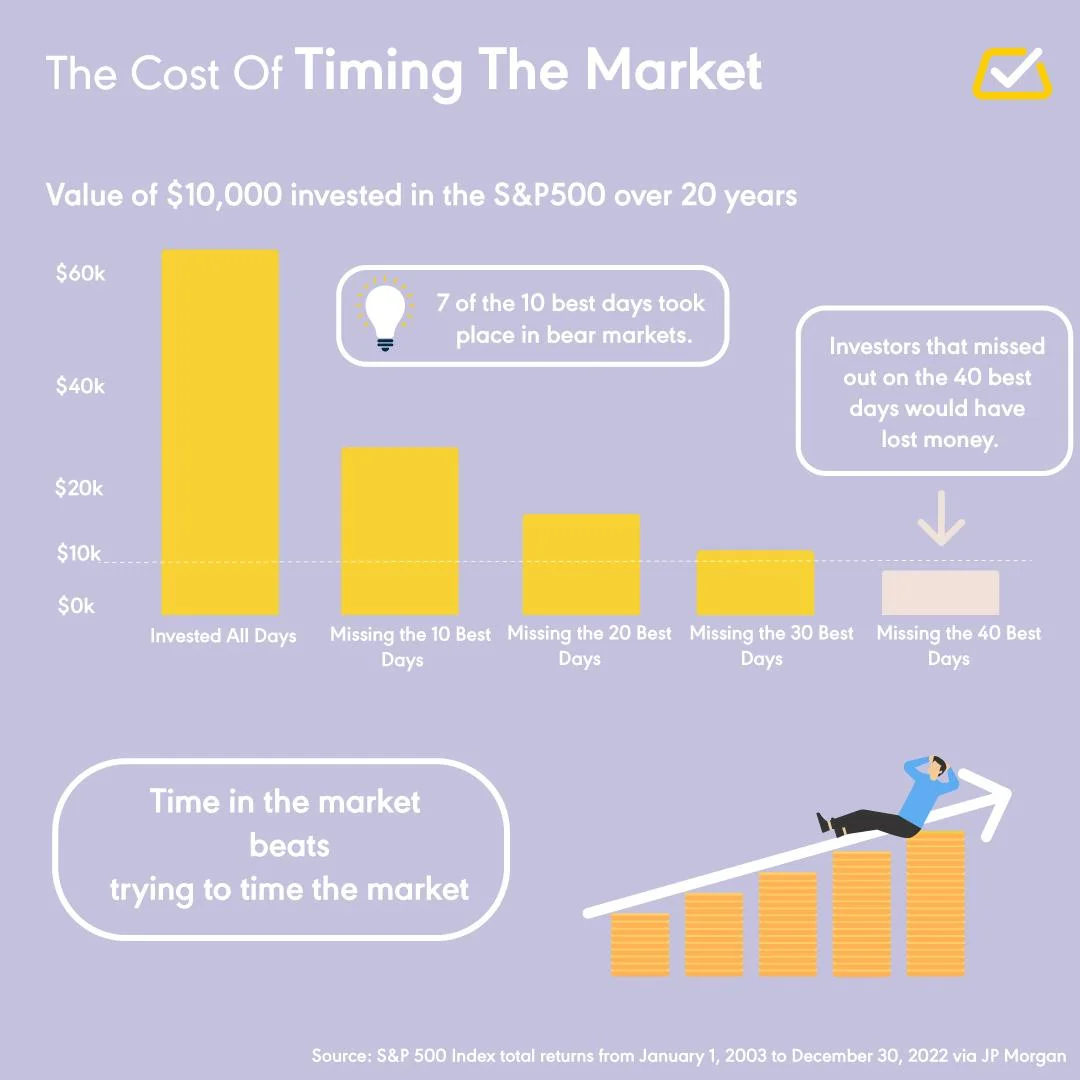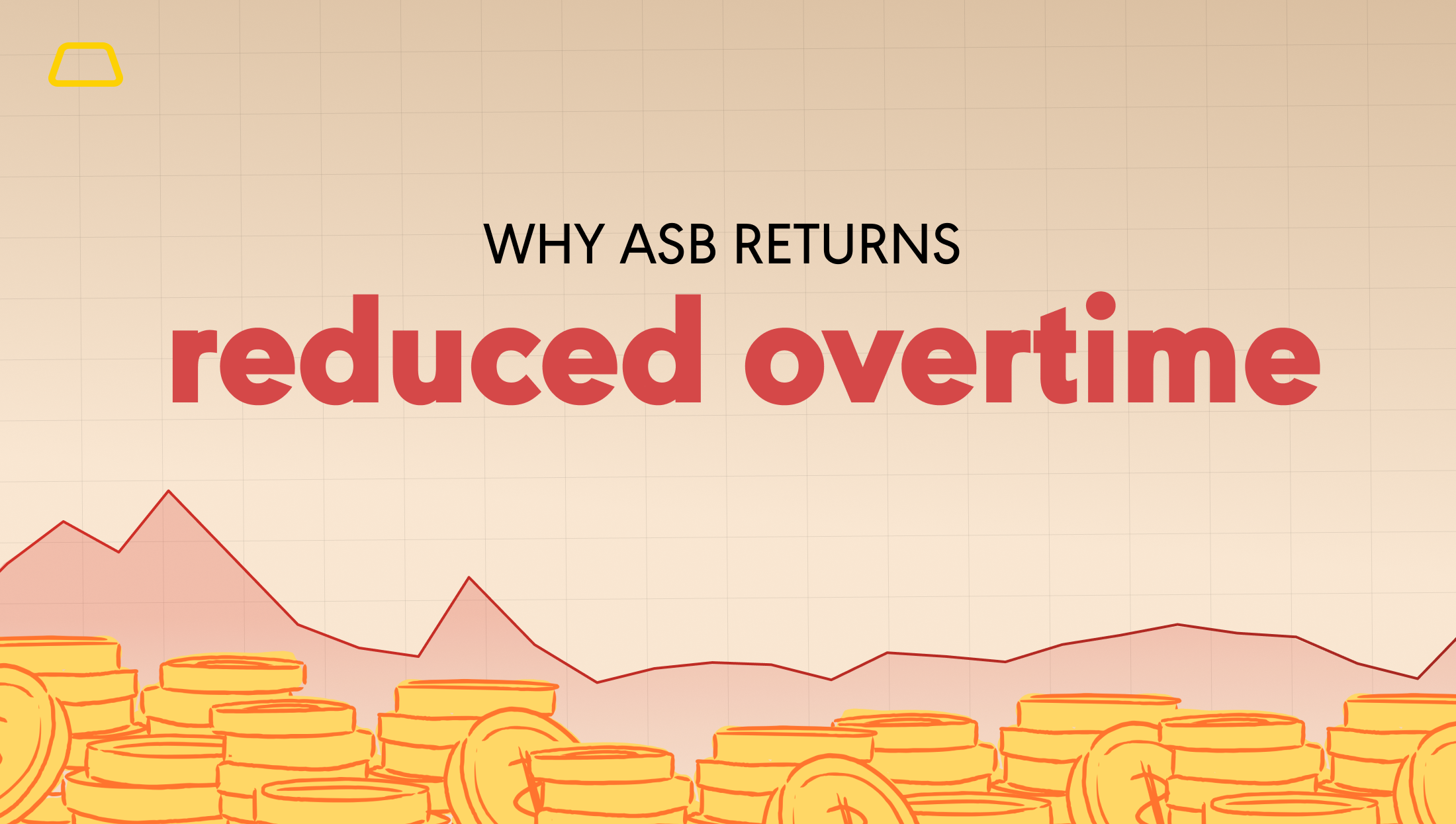Why does the stock market go up and down? An introduction to Bull and Bear Markets

Despite how it sounds, you’ve not unwittingly ended up on an article about buying and selling large, sometimes frightening, mammals. Having said that, the financial concepts that are bull and bear markets can also be scary to navigate without the right insight.
It might ring a bell when you hear ‘dot-com bust’ or ‘2008 financial crisis’. Over the last few decades, we’ve witnessed many economic shifts causing times of increased confidence as well as times of major uncertainty.
The markets, by which we normally mean the stock market, but also real estate, commodities and foreign currencies, react to these shifts and experience periods of highs and lows. When a market experiences highs, it’s known as a “bull market”, and when it experiences lows it’s commonly referred to as a “bear market”.
An emotionally charged investor will jump on the wave of euphoria in a bull market and panic in the doom and gloom of a bear market, both reactions can be bad for investments. A savvy investor will have a long-term strategy which plans for bull and bear market fluctuations. Read on as we discuss the ins and outs of bull and bear markets, and why we recommend passive investing so you don’t have to worry too much about them.
In a nutshell
- Bull markets are times of growth and confidence when it’s safer to invest but still important to diversify and mitigate risk.
- Bear markets are times of uncertainty which can present smart investment opportunities.
- Investing is time-consuming and involves elements of risk regardless of whether we’re in a bull or bear market.
- Wahed makes halal¹ investing simple and gives you access to diversified portfolios, across multiple asset classes, without needing to do any legwork.
What is a bull market?
Picture a powerful bull, no fear and head down. When it attacks, it thrusts its horns upward with conviction. Likewise, during a bull market there’s positivity, growth and strength. It’s generally agreed that when a market sees a 20% or higher rise over its previous low, it’s a bull market.
The market will still fluctuate in a bull market but we’ll see higher highs and higher lows. A bull market normally comes after a bear market and is then followed by another bear market. We only really know we’re in a bull market when we can look back at the data in retrospect. We can, however, see some of the signs at the time.
What leads up to a bull market?
Strong economic indicators - Gross Domestic Product (GDP - the value of goods and services produced in the country) growth tends to be positive, unemployment is low or falling and consumer spending is high. We’re less worried about saving and happy to spend and invest. This creates an upward trajectory in the economy.
Positive market sentiment - Seeing the upward trajectory creates confidence and makes investing appear less risky and more rewarding.
Low interest rates - In the earlier stages of a bull market, interest rates tend to be quite low so we have less incentive to save and more incentive to invest.
Favourable government policies - Government policies, such as tax cuts or stimulus measures, can free up our money and give us room to invest and grow our wealth.
Strong corporate earnings - Companies are reporting higher earnings which leads to further positivity in market sentiment and makes us more inclined to invest in them.
Recent bull market
The FTSE All Share index is an index made up of around 600 stocks on the London Stock Exchange, weighted according to market value of their outstanding shares.
Don’t worry, we don’t need to know what all that means, all we need to know is that it’s supposed to be a representation of how well the stock market is performing. It gives us a perfect example of bull and bear market cycles in recent history.
After the 2008 financial crisis when the economy crashed and investments plummeted, there was a turning point in the economy where share prices were low enough for investors to be interested in investing again. The central bank also reduced interest rates in response to the crisis so saving was no longer as enticing as before or the most feasible way to preserve or grow wealth. All of these factors led to increased spending and investment which, in turn, led to stock prices increasing. As people saw prices rising, they invested more and this created a 10 year period which saw a stock price increase of over 220%.
What is a bear market?
Now imagine a disgruntled bear, starting from a higher position and swiping its paws down on its prey. A bear market is the antithesis of a bull market. Confidence is low and the market is declining.
It’s generally agreed that when the market sees a 20% decline from its previous high, it becomes a bear market. Bear markets are also normally surrounded by bull markets due to the cyclical nature of the economy.
What leads up to a bear market?
Weaker economic indicators - GDP is falling, unemployment is high or rising and consumer spending is falling. We’re increasingly concerned about spending and investing and more inclined to save.
Negative market sentiment - Now the downward trajectory creates uncertainty and makes investment appear more risky.
High interest rates - Towards the end of the last bull market, interest rates would’ve been high so we’re more tempted to save as it carries less risk.
Unfavourable government policies - Austerity measures can stretch our personal finances, leaving us less scope for investing and growing our wealth.
Weak corporate earnings - Companies are reporting falls in profits or even losses which perpetuates negativity in market sentiment and deters us from investing.
Recent bear market
Carrying on with our example of the FTSE All Share index, the COVID-19 pandemic put an end to the bull market we mentioned above and marked the start of a bear market.
Worldwide pandemic responses, business closures, travel restrictions and general uncertainty caused a dramatic decline in the economy. The index price plummeted over 25% in just three months. Three months was all it lasted though, as demand was largely still there in the economy so, as supply returned, confidence followed.
The impact of bull and bear markets on your investments
It’s hard to look at the price of your investments rising and falling without reacting. Especially when you see the value of your portfolio dwindling. Due to the cyclical nature of bull and bear markets and the inability to know that we’re definitely in one, following your urge to buy and sell based on what the current state seems to be isn’t necessarily the best strategy.
In a bull market, we expect prices to rise so we might buy and hold or increase our investment to capitalize on the good times. For maximum gain, we want to buy while the price is at its lowest point and sell at its peak. Although we’ve talked about all the positivity surrounding a bull market, market fluctuations are completely random. We never really know when a bear market is around the corner. Even professional investment managers struggle with the uncertainty, and these are the people who make a living from predicting market behaviour.
During a bear market, investing can be unnerving because we’re most likely to make a loss before we ever see a profit. Even though we know things will get better, we don’t know when this will be or how much of a hit we’ll take in that time. It’s even possible that a stock we invest in might go bust while we wait for a recovery.
Why you shouldn’t worry about bull and bear markets
Tame the bear?
In a bear market we might pull back our investments while we wait for the market to bottom out. Investing at that point should maximize our return, right? It’s rarely that simple. Timing the market is ultimately down to chance.
Over a 20 year period in the S&P500, if you missed 10 of the best days in the market, your returns would be half that of someone who stayed invested the whole time. The numbers get bleaker and bleaker as you miss more of the best days.

An alternative option is to turn to savings but interest is impermissible and often cancelled out by inflation. We might also be tempted by short-selling strategies but that’s also impermissible so the possible gains would work against us as muslims.
Financial experts actually recommend having a long-term strategy based on our goals and how much risk we’re willing and able to take. They say it’s best to take the emotion out of our strategy and to not change our strategy according to bulls and bears. A study of the FTSE All Share index shows, the average bull market lasts six years while the average bear market lasts on average just over a year so there’s generally a net gain in the long run.
More baskets for our eggs
It’s an age-old cliche to not put all our eggs in one basket but it’s invaluable advice. Diversification is key regardless of the market conditions we’re in. Bull or bear, an individual stock might plummet while the market is doing well and vice versa. Spreading our investments across multiple stocks in varying sectors mitigates this risk.
For example, the pandemic crushed the hospitality industry but semiconductor manufacturers were largely unaffected. If we were investing before the pandemic, we couldn’t have known which would fare better but having both in our portfolio would’ve prevented a greater loss. Investment managers conduct complex analyses to identify a range of stocks that have varied risk profiles.
Save yourself the time and stress
It’s very time consuming to monitor the market and react to trends. For investment managers, it’s their full time job to monitor the stocks they invest in. If they want to invest in a stock, they can’t just look at the state of the company now. They need to consider the financial and organizational structure of the company, their competitors, the industries they rely on, and much more. They also need to think about the economies and political environments those companies operate in. With all that done, making a healthy return on their investments is still a challenge - the variables they need to consider are endless.
Before we even think about whether a stock we want to invest in is ethical Islamically, the sheer number of considerations can make investing a daunting prospect. How can we invest through these unpredictable times without having to dedicate so much time and effort? How can we be sure that the investments we’re making are going to benefit us in this life without compromising our hereafter? How can we be confident that the decisions we’re making are the right ones at the right times?
Keep calm and let the Wahed do the work
Wouldn’t it all be easier if we could just dedicate a portion of our wealth every month to investments without the need to worry about bull and bear markets? Dollar-Cost Averaging (DCA) is a strategy where we invest a constant amount each month regardless of stock price and benefit from the net positive trend in the market. The only issue is figuring out the best combination of stocks to invest in to maximize our return.
That's where Wahed comes in. Every month we help over 300,000 of our clients invest their money according to their specific needs and in line with their faith and values. If this is something you’re interested in, we’d start by asking you a series of curated questions designed to understand your risk profile. We’ll then present you with a selection of portfolios for you to choose from. Each portfolio is made up of several types of assets and the weighting of each of these assets has been carefully calculated by our experienced investment team to ensure it matches your needs.
We take the stress out of investing and allow you to fully automate your investments every month so you can focus on achieving your goals and doing the things that really matter.
Our focus is to give you performance without compromise but don’t just take our word for it, the graph above shows our actual performance for the past 5 years across a range of UK portfolios. Our results speak for themselves.
Click here to get started on your journey to halal investing.
1. The term 'Halal' denotes that it is permitted and follows Islamic law
Risk Warning: Equity investments are not readily realisable and involve risks, including loss of capital, illiquidity, lack of dividends and dilution, and it should be done only as part of a diversified portfolio. Investments of this type are only for investors who understand these risks. You will only be able to invest in the company once you have met our conditions for becoming a registered member.
Please visit www.wahed.com/uk/ventures/risk for our full risk warning.
Risk Warning: As with any investment, a Wahed Invest Ltd investment puts your money at risk, as the value of your investment can go down as well as up. The tax treatment of your investment will depend on your individual circumstances and may change in the future. If you are unsure about whether investing is right for you, please seek expert financial advice.
Please visit www.wahed.com for our full terms and conditions
Maydan Capital Limited, trading as WahedX, is registered in England and Wales (Company No. 13451691), registered office: 87-89 Baker Street, London, W1U 6RJ, UK. Maydan Capital Ltd (FRN: 963613) is an appointed representative of Wahed Invest Ltd (FRN: 833225), an authorised and regulated firm by the Financial Conduct Authority.Wahed Invest Ltd. is registered in England and Wales (Company No. 10829012), registered office: 87-89 Baker Street, London, W1U 6RJ, UK and is authorised and regulated by the Financial Conduct Authority: FRN 833225.
Subscribe For More Islamic Finance Content
As with any investment, a Wahed Invest Ltd investment puts your money at risk, as the value of your investment can go down as well as up. The tax treatment of your investment will depend on your individual circumstances and may change in the future. If you are unsure about whether investing is right for you, please seek expert financial advice.
Wahed Invest LLC (Wahed) is a US Securities and Exchange Commission (SEC) registered investment advisor. Wahed Invest provides brokerage services to its clients through its brokerage partner Apex Clearing Corporation, a member of NYSE - FINRA - SIPC and regulated by the SEC and the Commodity Futures Trading Commission. Registration does not imply a certain level of skill or training. Wahed does not intend to offer or solicit anyone to buy or sell securities in jurisdictions where Wahed is not registered or a region where an investment practice like this would be contrary to the laws or regulations. Any returns generated in the past do not guarantee future returns. All securities involve some risk and may result in loss. Any performance displayed in the advertisements or graphics on this site are for illustrative performances only.
Disclaimer: Wahed Technologies Sdn Bhd ("Wahed") is a Digital Investment Manager (DIM) licensee issued by Securities Commission Malaysia (eCMSL/ A0359/2019). It is part of Wahed Inc. Wahed is authorized to conduct a fund management business that incorporates innovative technologies into automated portfolio management services offered to clients under a license issued pursuant to Schedule 2 of the Capital Markets Services Act 2007. All investments involve risks, including the possibility of losing the money you invest, and the track record does not guarantee future performance. The history of returns, expected returns, and probability projections is provided for informational and illustrative purposes, and may not reflect actual future performance. Wahed is not responsible for liability for your trading and investment decisions. It should not be assumed that the methods, techniques, or indicators presented in this product will be profitable, or will not result in losses. The previous results of any trading system published by Wahed, through the Website or otherwise, do not indicate future returns by that system, and do not indicate future returns that will be realized by you.
Wahed Invest Limited is regulated by ADGM’s Financial Services Regulatory Authority (“FSRA”) as an Islamic Financial Business with Financial Services Permission for Shari’a Compliant Regulated Activities of Managing Assets and Arranging Custody [Financial Permission No. 220065]. Our ADGM Registered No. is 000004971.
Wahed assumes no obligation to provide notifications of changes in any factors that could affect the information provided. This information should not be relied upon by the reader as research or investment advice regarding any issuer or security in particular. Any strategies discussed are strictly for illustrative and educational purposes and should not be construed as a recommendation to purchase or sell, or an offer to sell or a solicitation of an offer to buy any security. Furthermore, the information presented may not take into consideration commissions, tax implications, or other transactional costs, which may significantly affect the economic consequences of a given strategy or investment decision. This information is not intended as a recommendation to invest in any particular asset class or strategy or as a promise of future performance.
There is no guarantee that any investment strategy will work under all market conditions or is suitable for all investors. Each investor should evaluate their ability to invest long term, especially during periods of downturn in the market. Investors should not substitute these materials for professional services and should seek advice from an independent advisor before acting on any information presented. Any links to third-party websites are provided strictly as a courtesy. We make no representation as to the completeness or accuracy of information provided at these websites nor do we endorse the content and information contained on those sites. When you access one of these websites, you are leaving our website and assume total responsibility and risk for your use of the third-party websites.







